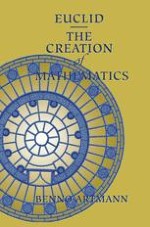1999 | OriginalPaper | Chapter
The Origin of Mathematics 12: Incommensurability and Irrationality
Author : Benno Artmann
Published in: Euclid—The Creation of Mathematics
Publisher: Springer New York
Included in: Professional Book Archive
Activate our intelligent search to find suitable subject content or patents.
Select sections of text to find matching patents with Artificial Intelligence. powered by
Select sections of text to find additional relevant content using AI-assisted search. powered by
Aristotle, near the beginning of his Metaphysics, a most prominent place, quotes incommensurability as the prototype of a scientific discovery. After a short general description of philosophy he writes: [The first philosophers] were pursuing science in order to know, and not for any utilitarian end…Evidently then we do not seek it [philosophy] for the sake of any other advantage; but as the man is free, we say, who exists for himself and not for another, so we pursue this as the only free science, for it alone exists for itself [982b 20-27]…All the sciences, indeed, are more necessary than this [philosophy], but none is better. Yet the acquisition of it must in a sense end in something which is the opposite of our original inquiries. For all men begin, as we said, by wondering that the matter is so (as in the case of … the solstices or the incommensurability of the diagonal, for it seems wonderful to all men who have not yet perceived the explanation that there is a thing which cannot be measured even by the smallest unit). But we must end in the contrary and, according to the proverb, the better state, as is the case in these instances when men learn the cause; for there is nothing which would surprise a geometer so much as if the diagonal turned out to be commensurable. [Metaphysics 983a 10-21]
